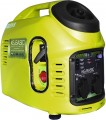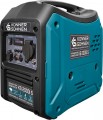Motor type
Model name of the engine installed in the generator. Knowing this name, you can, if necessary, find detailed data on the engine and clarify how it meets your requirements. In addition, model data may be needed for some specific tasks, including maintenance and repair.
Note that modern generators are often equipped with
branded engines from famous manufacturers: Honda, John Deere, Mitsubishi, Volvo, etc. Such engines are more expensive than similar units from little-known brands, but this is offset by higher quality and/or solid warranty conditions , and in many cases, the ease of finding spare parts and additional documentation (such as manuals for special maintenance and minor repairs).
Power
The operating power of the engine installed in the generator. Traditionally stated in horsepower; 1 HP approximately equal to 735 watts.
First of all, the rated power of the generator directly depends on this indicator (see above): in principle, it cannot be higher than the engine power, moreover, part of the engine power is spent on heat, friction and other losses. And the smaller the difference between these capacities, the higher the efficiency of the generator and the more economical it is. However high efficiency affects the cost, but this difference can pay off with regular use due to fuel savings.
Fuel consumption (50% load)
Fuel consumption of a petrol or diesel generator when operating at half power, and for combined models when using petrol (see “Fuel”).
Fuel consumption usually increases with load. However, generator efficiency is not always linear - fuel consumption may vary disproportionately with different loads. In this case, the approximate amount of fuel consumed by the generator when operating at half power (50% of the rated power) is given. Knowing the fuel consumption and tank capacity, you can at least estimate how long one fill-up will last.
Fuel tank volume
The volume of the fuel tank installed in the generator.
Knowing the fuel consumption (see above) and the capacity of the tank, you can calculate the operating time on one gas station (if it is not indicated in the specifications). However, a more capacious tank is also more bulky. Therefore, manufacturers choose tanks based on the general level and "voracity" of the generator — in order to provide an acceptable operating time without a significant increase in size and weight. So in general, this parameter is more of a reference than practically significant.
As for the numbers, in low-power models, tanks are installed for
5 – 10 liters, or even
less ; in heavy professional equipment, this figure can
exceed 50 liters.
Fuel level indicator
A pointer that allows you to monitor the remaining fuel in the generator tank. The simplest such
indicators work only with a critical decrease in the level of fuel, warning of the need for refueling; more advanced ones constantly display the remainder. However, anyway, this feature makes it easier to keep track of the fuel supply and reduces the risk of a generator shutdown due to a forgotten refueling.
Total number of sockets
The total number of sockets for 230 and/or 400 V provided in the design of the generator.
This number corresponds to the number of devices that can be simultaneously connected to the generator without using splitters, extension cords, etc. If it is a three-phase model (see "Output voltage") with different types of sockets, it is worth specifying the quantity of each type separately, as different models may have varying configurations. For example, a unit specified as having
3 sockets might have 1 three-phase socket and 2 single-phase ones, or 2 three-phase and 1 single-phase socket. Generally, the most basic modern generators have only
1 socket, though models with
2 sockets are more common; and the most powerful models can have
4 or more sockets.
It is also important to remember that the ability to connect various devices is limited not only by the number of sockets but also by the generator's rated power (see above for more details).
Sockets 230 V
The number of 230 V sockets provided in the design of the generator, as well as the type of connectors used in such sockets.
The type of connector in this case is indicated by the maximum power that is allowed for the outlet - for example, “2 pieces for 16 A”. The most popular options for 230-volt outlets are
16 A,
32 A, and 63 A. We emphasize that amperes in this designation are not the actual power that the generator can produce, but the outlet’s own limitation; the actual power value is usually noticeably lower. Simply put, if, for example, the generator has a 32 A socket, the output power on it will not reach 32 A; and the specific number of amperes will depend on the rated and maximum power of the unit (see above). So, if for our example we take a rated power of 5 kW and a maximum of 6 kW, then to a 230 V outlet such a generator will be able to produce no more than 5 kW / 230 V = 22.7 A standard and 6 kW / 230 V = 27, 3 A at its peak. And if the power has to be divided between several outlets, then it will accordingly be even less.
As for specific types of connectors, the higher the power permissible for the outlet, the higher the requirements for its reliability and quality of protection. In light of this, as a rule, higher power outlets can be connected to lower power plugs (directly or through an adapter), but not vice versa. And if there are several sockets, by their type it i
...s possible to estimate with some certainty the distribution of the entire power of the generator between them: between two identical sockets such power is usually divided equally, and more power is allocated to an socket with a larger number of amperes and power. However, specific details on this matter should be clarified separately in each case; It's also worth considering 400V outlets, if available (see below).USB charging port
The generator has
a USB connector(one or more) for charging various devices. Most modern smartphones and tablets can be charged from USB, and this charging method is also found in many other equipment - from cameras and flashlights to electric screwdrivers and radio-controlled models. The standard supply voltage through this connector is 5 V, but the power may be different, it should be specified separately.
Output 12 V
Existence in the generator of an
output with a direct current and voltage of 12 V. The main function of this output is to charge car batteries, as well as power devices originally intended for cars (recall, 12 V is the standard voltage of on-board networks in cars).
The following types of 12-volt outputs are found in generators:
- Terminals. Terminals are used to connect wires directly without using any plugs. This connection is the most reliable.
- Socket. Socket outlet for a plug with two flat pins, designed to connect 12-volt consumers. Holes in sockets come in different layouts, which you need to pay attention to.
- Cigarette lighter. The so-called "car socket", which in many cars is combined with a cigarette lighter socket (hence the name). Such connectors are used to power various automotive devices and accessories.

